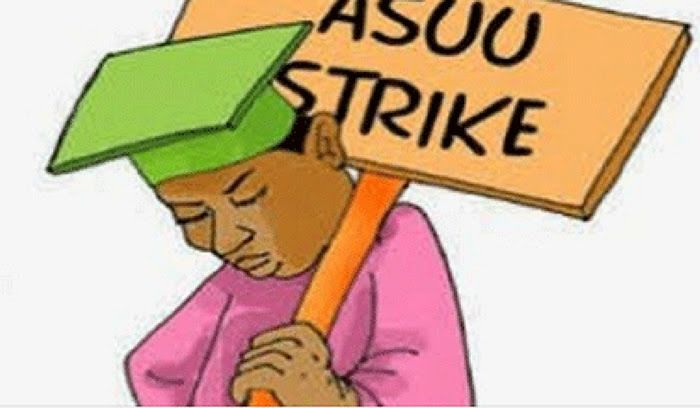Sequel to the planned nationwide strike by the President of the Academic Staff Union of Universities (ASUU), Prof. Chris Piwuna, the Ibadan zone of the Union on Monday reiterated its readiness to protest on Tuesday.
This is as it said there had been relative calm in the Ivory Towers over the past few months because of the hope that the administration of President Bola Tinubu would honour its promises and resolve their age-long demands.
Stressing that the looming strike was necessitated by the Federal Government’s piecemeal and frustrating handling of unresolved matters affecting Universities, Dr. Biodun Olaniran, Zonal Co-ordinator of the Union, while addressing journalists at the ASUU Secretariat, University of Ibadan, reiterated the Union’s demands to include “Re-negotiation of the 2009 ASUU-FGN Agreement; Sustainable funding/Revitalization of universities; University Autonomy Victimization of our members in LASU, KSU, and FUTO; Outstanding 25-35% salary areas and Third-Party Deductions; Promotion Arrears for over 4 years; Non payment and mainstreaming of Earned Academic Allowance in Public Universities”.
The Zonal Union comprising the University of Ibadan, Ibadan; University of Ilorin, Ilorin; Ladoke Akintola University of Technology, Ogbomoso; Osun State University, Osogbo; Kwara State University, Malete; and Emmanuel Alayande University of Education, Oyo), lamented that staff salaries “have remained virtually stagnant for the past sixteen (16) years, despite the clear understanding that the 2009 renegotiated agreement would be reviewed every three (3) years.
It however announced that the zonal council will embark on a protest on Tuesday on the campus of the University of Ibadan to further press home their demands.
The statement said, “Unfortunately, it took the government a staggering eight (8) years—until 2017—to even constitute renegotiation committee for this purpose. Since then, successive committees, including the Wale Babalakin-led Joint Renegotiation Committee, the Professor Munzali Jubril-led Committee, and later the Late Emeritus Professor Nimi Briggs-led Committee, have been set up to engage ASUU.
The outcome of these engagements was a draft agreement reached in 2021 between ASUU and the Nimi Briggs-led Committee. However, despite the fact that this committee was appointed by the government itself, Government have refused to sign the resulting draft”.
The zonal branch lamented that while other countries steadily advance by allocating the UNESCO-recommended 15–26% of their national budgets to education, “Nigeria continues to fall short—barely reaching 7% in the 2025 budget.
This underfunding has severely affected the quality of education, limiting access, resources, and the ability of our institutions to compete on a global scale. Notably, Nigeria lags behind nations like Kenya and Ghana, which allocate 20% and 13% of their budget respectively.
“Alarmingly, no Nigerian public university ranks among the top 1000 globally. The physical decay of lecture rooms and the deplorable state of student accommodations further underscore the crisis.
Our union’s demands are clear: there must be a deliberate and purposeful commitment to adequate funding in order to rescue our institutions from impending collapse”.
The persistent erosion of university autonomy by the government was also on the front burner of the ASUU demands, noting that it “has strongly opposed the unlawful dissolution of Governing Councils in public universities, even in instances where no misconduct has been reported and the councils have not completed their statutory tenure.
Instead of addressing these concerns, the Tinubu-led administration hastily reconstituted the councils, further deepening the crisis by appointing political allies, supporters, and godfathers as members and Pro-chancellors of most of the new councils”.
Though the Federal Government earlier this year released the promised ₦50 billion meant for ASUU, the Union said “contrary to the agreement that the funds were exclusively for academic staff, the amount was distributed among all university staff.
This resulted in a shortfall, with ₦10 billion still owed to academic staff. Furthermore, the mainstreaming of EAA—originally slated to commence in 2022—has yet to be implemented in federal and most state universities, rendering the commitment unfulfilled”, the Union said.















